
For upcoming PhD defences , see the group defences page.
News
Prof. Petra de Jongh receives ERC Advanced Grant for PromSusCat research
(April 2024)
Full press release
Congratulations to Prof. Petra de Jongh for securing an ERC Advanced Grant for fundamental research into the role of promoters on catalysts for the production of fuels from CO2. Prof. De Jongh and her team will research the complex interactions between a promoter and catalyst. This will involve a combination of advanced electron microscopy and x-ray spectroscopy techniques to study the catalyst in situ. Like much of prof. De Jongh’s research, this project is at the intersection of chemistry and physics, and aims to gain essential fundamental understanding to develop new and better catalysts.
Gravity funding for ANION project
(April 2024)
Full press release

The Advanced Nano-electrochemistry Institute of the Netherlands (ANION) consortium, led by dr. Marc Koper, has received the ‘Zwaartekracht’ or Gravity funding. Prof. Petra de Jongh was co-applicant for the proposal. The new consortium seeks to bring together chemists and physicists to investigate electrochemical processes at the smallest scales to find new fundamental insights. Scientists from the Debye Institute for Nanomaterials Science will contribute by investigating solid-liquid interfaces in electrochemical processes and electromicroscopy to visualize such processes.
25th Netherlands’ Cataysis and Chemistry Conference
During the week of March 4th, the 25th Netherlands’ Catalysis and Chemistry Conference took place in Noordwijkerhout, the Netherlands. This festive special edition was organized by a committee from Utrecht University with prof. Petra de Jongh (MCC) as chairwoman and prof. Pieter Bruijnincx (OCC) as vice-chairman. For this quarter-century milestone, the committee also invited emeriti who were part of the first NCCC organizing committee. More can be read on the website of C2W.
Dr. Nong Artrith wins Sebastian Haben award for Open Science!

Dr. Nong Artrith, assistant professor at the Materials Chemistry and Catalysis group of the Debye Institute, received the first Sebastian Haben award. The other winner was PhD candidate in Biomolecular Mass Spectrometry and Proteomics, Douwe Schulte. Nong’s nomination stood out because her career encompasses a combination of open software, open data and open education. She developed Atomic Energy Network (ænet), an open-source software for the use of machine learning models in materials science. This software is also used by the PhD candidates in the MCC group for their research into novel energy materials. She publishes her datasets alongside the manuscripts on Materials Cloud. Finally, she is committed to open education and has posted several lectures and tutorials online with the relevant materials. The jury was impressed by her inspiring efforts in both open science and education.
Prof. Petra de Jongh wins Gilles Holst Medal!

(November 2023)
Full article: Dutch, English.
Our group leader prof. Petra de Jongh has received the Gilles Holst Medal, in recognition of her contributions to science towards the sustainable energy transition. The jury praised her specifically on: “[…] her interdisciplinary approach [to research], her tireless quest for knowledge, and the industrial applications that emerge from her research on nanomaterials.” Prof. Petra de Jongh is the first woman to receive this medal since its establishment in 1960. We congratulate Petra for winning this prestigious medal!
Petra de Jongh researches the connection between catalyst structure and performance with advanced characterization methods. Through collaborative efforts with industry, her investigations contribute to the advancement of novel processes like sustainable methanol, hydrocarbon, or ammonia synthesis—which are crucial for achieving a circular economy. Additionally, Petra and her team are pioneering the creation of next-generation batteries, aiming for enhanced safety, reduced weight, and increased efficiency. These advancements play a pivotal role in facilitating a sustainable transition towards cleaner energy sources.
The Gilles Holst Medal was established in 1960 by the KNAW (Royal Netherlands Academy of Arts and Sciences) as a tribute to physicist and Academy member Prof. Dr. Gilles Holst (1886-1968). It serves as recognition for a researcher working in the Kingdom of the Netherlands with significant achievements in the field of applied physics or chemistry, preferably at the intersection of both disciplines. The Gilles Holst Medal is awarded once every four years, and the recipient is presented with a gold-plated silver medal.
In the week of 8-12 October, PhD students Maaike Vink-van Ittersum and Henrik Rodenburg travelled to Gothenburg, Sweden, together with dr. Peter Ngene to present at the 244th Electrochemical Society Meeting. Maaike presented about her research on Pore Size Effects in Templated Porous Ag Electrodes for Electrochemical CO2 Reduction.
Henrik gave an oral presentation about his research on Mixed Ionic-Electronic Conductivity in Oxygen-Free K2NiF4-Type Hydrides, which was recently published in Solid State Ionics. In the paper the authors report on the successful synthesis of two mixed electronic/ionic conductors, Rb2CaH4 and Cs2CaH4, which show reasonable ionic conductivity below 150°C.
Dr. Peter Ngene presented the results on Interface Induced Fast Ion Conduction in Complex Hydride/Oxide Nanocomposites: Interplay between Hydride and Oxide Properties.
Prof. dr. Petra De Jongh, dr. Jessi van der Hoeven, Suzan Schoemaker, Oscar Brandt Corstius, and Maaike Vink-van Ittersum presented lectures at the EuropaCat congress in August.
Prof. dr. De Jongh gave a lecture on ‘Competition between reverse water gas shift reaction and methanol synthesis from CO2: Influence of copper particle size’, and dr. Jessi van der Hoeven presented a lecture on ‘Unraveling 1-Hexene Hydrogenation over Dilute Pd-in-Au Alloys’. Moreover, Suzan Schoemaker presented her recently published work on ‘Carbon nanofiber growth from methane over carbon-supported NiCu catalysts: Two temperature regimes’, Oscar Brandt Corstius presented his research on ‘Bimetallic Pd-based catalysts for selective hydrogenation of butadiene’, and Maaike van Ittersum gave a presentation about ‘Pore size effects in porous Ag electrodes for electrochemical CO2 reduction’.

On the 20th of August, several of our PIs and PhDs travelled to The Hague to present at IUPAC | CHAINS 2023. Dr. Peter Ngene presented about Interface engineered metal hydrides as multi-functional energy materials. In another parallel session, dr. Nongnuch Artrith discussed Atomistic Modeling Unveiling Complex Glassy-Ceramic Battery Structures. PhD candidate Oscar Brandt Corstius presented his results of Bimetallic Pd-based catalysts for selective hydrogenation of butadiene, and Henrik Rodenburg presented his work on Mixed hydride-electronic conductivity in Rb2CaH4 and Cs2CaH4. To find out more about these respective projects, visit our research page.
Other PhD candidates brought posters to showcase their research: Just Pé Jonasse brought a poster with his recent work on the influence of lattice strain on core-shell catalyst performance, Juliette Verschoor’s poster outlined her research on metal hydride nanocomposites as catalysts for ammonia synthesis, Jonas Hehn’s poster illustrated his research about interface effects in solid-state electrolytes for lithium-ion batteries, and Matt Peerlings brought a poster which discussed his work on CuZn-based electrodes for electrochemical CO2 reduction to CO.
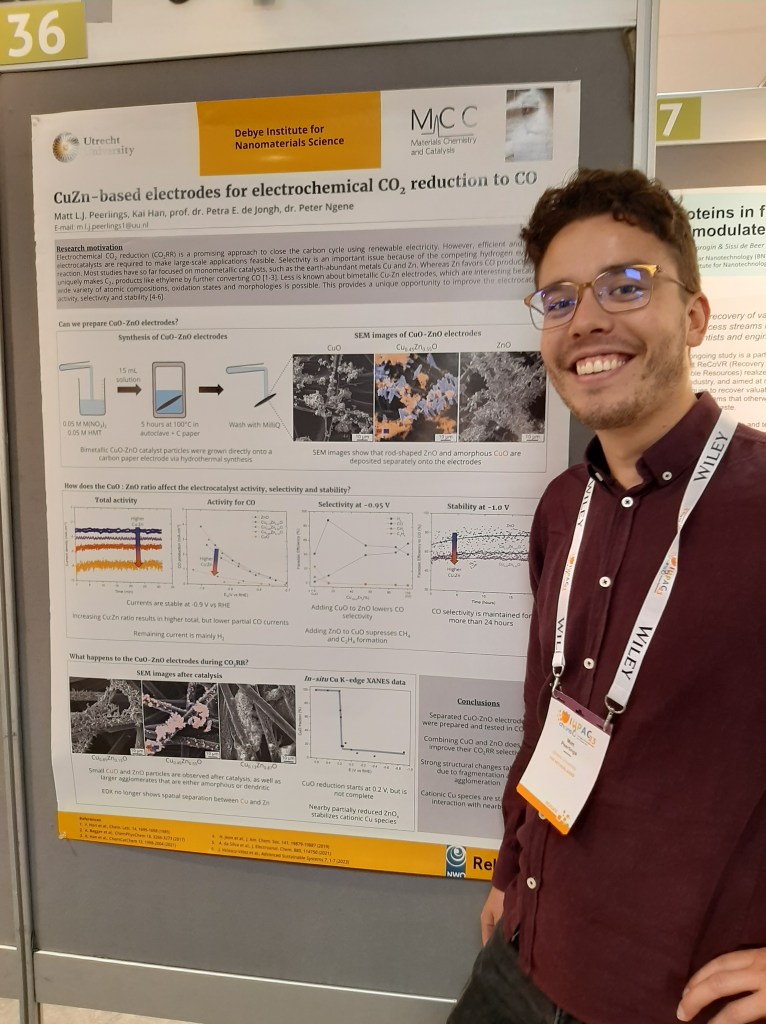
In July, three of our PhD candidates travelled together with prof. Petra de Jongh and prof. Krijn de Jong to Louvain-la-Neuve in Belgium for PREPA13: International Symposium on “Scientific Bases for the Preparation of Heterogeneous Catalysts”. On the first day, Luc Smulders gave the first plenary lecture on “Advanced preparation of metal-acid bifunctional catalysts to control metal nanoparticle location”!
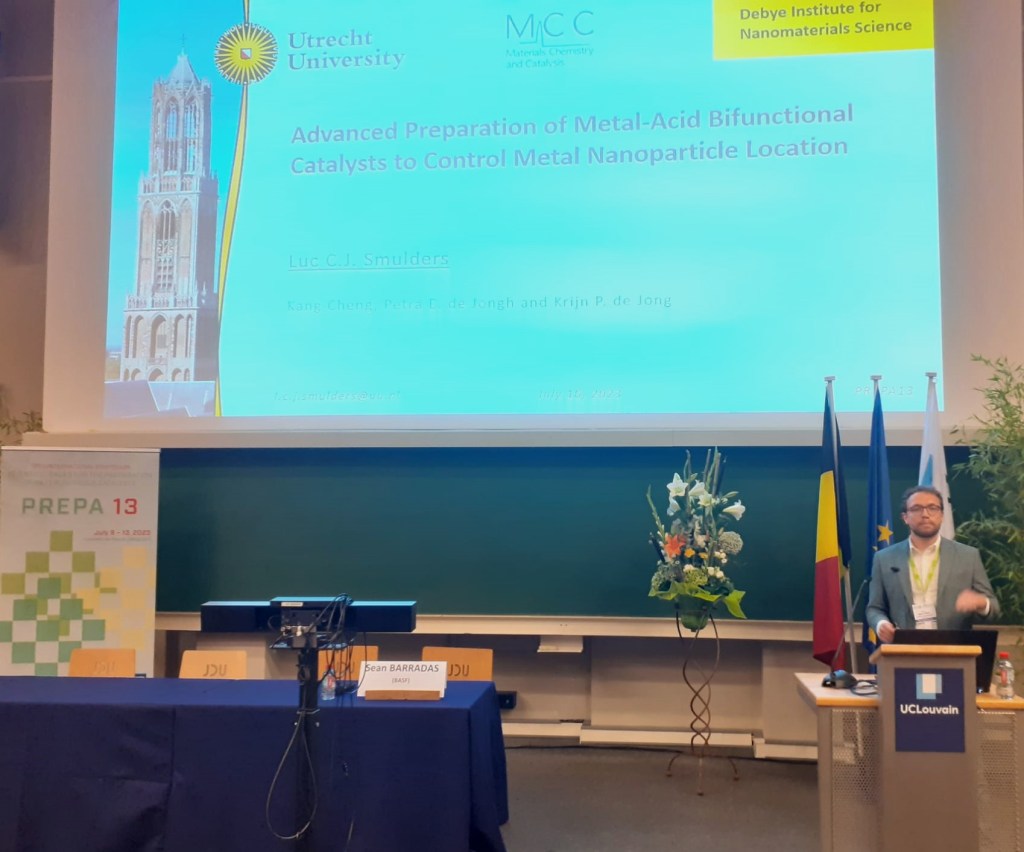
Later, Claudia Keijzer presented her work on “High surface area alpha-alumina: effect of carbohydrate template size and heat treatment on phase purity”, and Kris Helfferich presented a poster on “Alloyed Pd-Ni/SBA-15 nanoparticles for cinnamaldehyde hydrogenation”.

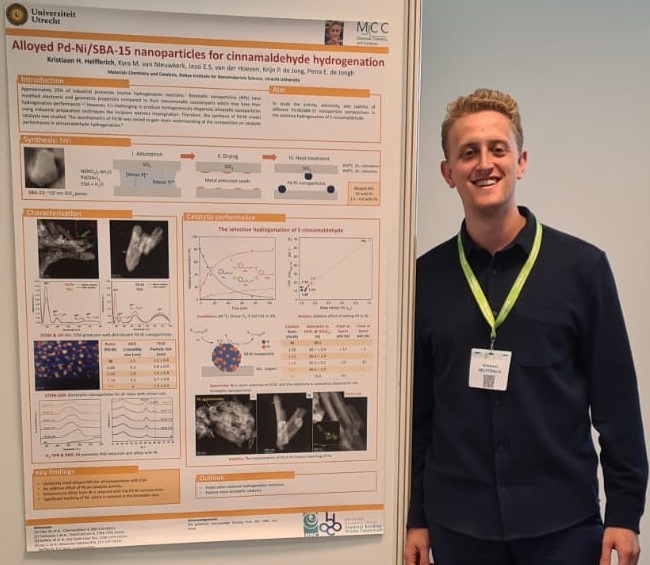
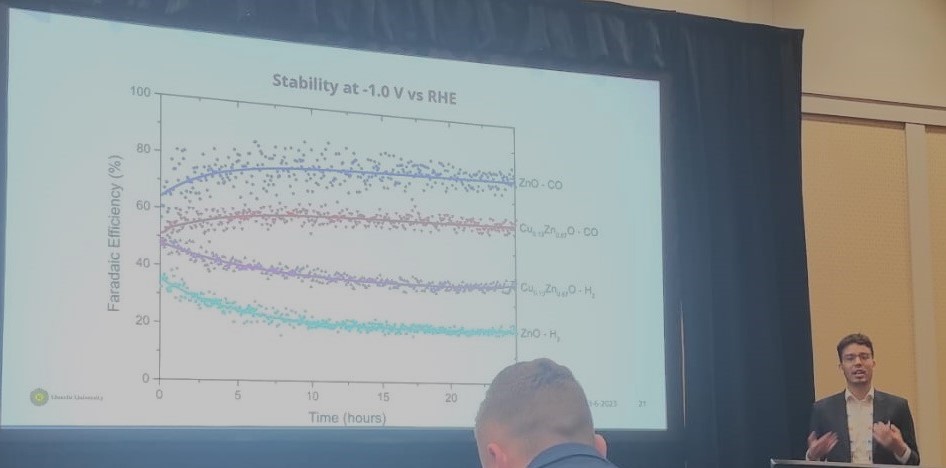
On June 23rd, PhD candidate Matt Peerlings presented his work on CuZn-based electrodes for selective electrochemical CO2 reduction at the 28th North American Catalysis Society Meeting (NAM28). He discussed recent results that show that his Cu/ZnOx electrocatalyst selectively reduces CO2 to CO. More information can be found here.

At the end of May, Marta went by train to Strasbourg to attend the European Materials Research Society (EMRS) spring meeting, where she presented her work on “Studying restructuring of Au-Pd core-shell catalysts using in situ Transmission Electron Microscopy” in a in situ TEM session filled with nice images and videos. The abstract can be found here.

On Friday 14 April, the Electron Microscopy Centre was officially opened! Many MCC researchers regularly use the electron microscopes for a variety of applications, ranging from imaging surfaces and determining pore and particle sizes to the imaging of catalyst performance during reactions.
Nong Artrith’s interview titled “A better environment starts with reflection!” has been published by Illuster Magazine. During the interview, she discussed her ongoing research on the search for cheaper and more efficient catalysts for hydrogen production using AI and big data. This project is funded by the Pathways to Sustainability – Energy in Transition Hub Seed (Utrecht University).
Illuster is the Utrecht University alumni magazine and portrays the university, its alumni, students, and employees with interviews, articles, and background stories.
Press release: Dutch | English


On Saturday 6 May 2023, there will be a Family & Friends day. PhD candidates, postdocs, PIs and support staff can invite friends and relatives to see our laboratories. You can find more information here.
On January 12th 2023, a consortium of companies, multinationals and knowledge institutes attended the kick off meeting for BatteryNL. The MCC group (Peter Ngene and Petra de Jongh) is one of the five founding groups of this consortium, which will work in the coming 8 years on developing next generation batteries based on a better understanding of electrode and electrolyte nanomaterials and interfaces. Press release: Dutch | English


For her MSc thesis, written based on her work in the MCC group with Nienke Visser, Juliette Verschoor was awarded the second prize of the Nederlandse Gasindustrieprijzen 2022. The jury was impressed by the wide variety of experiments she employed in her work to improve the life span of carbon-supported nickel catalysts for the conversion of carbon dioxide and hydrogen to methane (‘synthetic natural gas’). She was also commended for the clarity with which she was able to relate these experiments to her research questions. We congratulate Juliette for winning this prestigious prize! (November 2022)

At the Solid State Ionics conference (SSI-23) in Boston, USA, four MCC members had the opportunity to present their work. Valerio, Laura de Kort, Peter and Henrik shared their work on solid-state electrolytes and batteries. They also got to see the city, including MIT and Harvard, to both of which they were invited for a short visit. (July 2022)
Nanoscientists from Utrecht University have devised a new and promising way to make catalysts in which the amount of precious metals needed is reduced by a factor of 10. Those precious metals are scarce, but essential in many existing and future, more sustainable chemical processes. The publication appeared on 8 July 2022 in the renowned scientific journal Science. Article | Press release

Ad meer dan 40 jaar bij de UU! We vierden onlangs met een gezellige lunch dat Ad van der Eerden al meer dan 40 jaar geleden bij de Universiteit Utrecht in dienst is gekomen. Een bijzondere gelegenheid, en speciaal voor hem waren zelfs twee gasten uit het buitenland gekomen… (juni 2022)


AMBHER – Peter Ngene and Petra de Jongh have been awarded a EU HORIZON RESILIENCE grant to develop a more effective ammonia synthesis catalysts, in a collaborative effort of european academic and industrial partners to investigate the potential of green ammonia for seasonal renewable energy storage (June 2022).
During our annual lab outing, we solved a centuries-old murder mistery in the historic centre of Utrecht as part of an escape tour! Two hours after taking this group picture at the Academy building, we were all able to escape the city (June 2022).

In a recent article in ACS Catalysis by Remco Dalebout, Petra de Jongh and many other researchers from our group, as well as collaborators from Sorbonne, Utrecht and Paris, new insights into copper-based, zinc-promoted methanol synthesis catalysts are revealed. Using time-resolved X-ray absorption spectroscopy, it is found that on carbon-supported catalysts a major part of the zinc promoter was reduced and mixed with copper to form a CuZn alloy under high-pressure methanol synthesis conditions. (May 2022)

The SMART-X Chapter has highlighted Heba, Nong, Jessi, and Petra’s advice to young researchers on International Women’s Day.







Fei Chang, Peter Ngene and Petra de Jongh, together with other researchers from Utrecht and Eindhoven managed to design and make an ammonia synthesis catalysts catalyst that operates under moderate conditions and only contains carbon and potassium, yet rivals that based on scarce metals. The results were published in Nature Catalysis. Read more in Dutch or English. (March 2022)
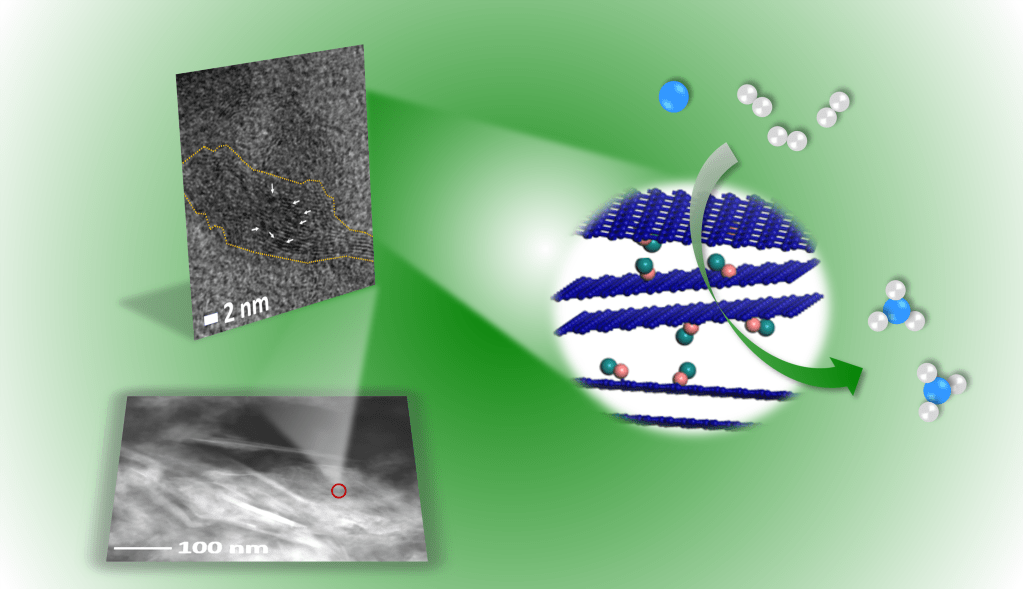
The FAIR-battery project, in which Peter Ngene participates, has been funded with a grant from the Centre for Unusual Collaborations (CUCo). The aim of the project is to develop ‘an open-source electrochemical battery technology that can be deployed and maintained in the field, for residential users, small scale commercial use, and rural health posts’. Read more about the project and the grant here. (February 2022)

Our annual ice skating event was a great success this year! After a few years’ interruption, many within MCC set foot on ice once again to revive the tradition. (February 2022)

This January, Nong Artrith was awarded funding for the !AIQU project through the Bayer Life Science Collaboration.
The goal of the new !AIQU collaboration is to bridge Artificial Intelligence (AI) and QUantum mechanics to develop improved computational approaches. Combining the predictive power of QM calculations with the efficiency of AI / machine learning techniques has the potential to establish rapid and accurate predictions for industrially relevant properties at large scale. This collaboration involves several partners from industry and academia. Read more about the project here. (26 January 2022)

This January, Nienke Visser, PhD candidate supervised by Petra de Jongh and Jessi van der Hoeven won the poster prize with her poster ‘Particle Size Effects of Carbon Supported Nickel Nanoparticles for High Pressure CO2 Hydrogenation to Methane’ at the 758. WE-Heraeus-Seminar. The focus of the seminar was ‘From Wind and Solar Energy to Chemical Energy to Chemical Energy Storage: Understanding and Engineering Catalysis under Dynamic Conditions’.
https://www.we-heraeus-stiftung.de/veranstaltungen/seminare/2022/from-wind-and-solar-energy-to-chemical-energy-storage-understanding-and-engineering-catalysis-under-dynamic-conditions/
(January 2022)









